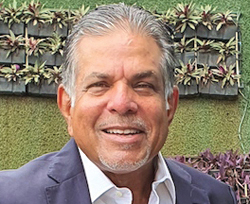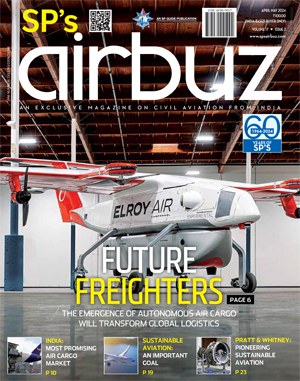Global Aviation Summit
The global aviation summit created a platform for key industrial discussions that covered a wide array of topics pertaining to the aviation industry

An important part of the Wings India 2022 event was the Global Aviation Summit. The Summit spanned across the first two days of the show and comprised of various discussions and sessions that touched upon a wide spectrum of topics pertaining to the aviation industry. Many of the key players from the best of the organisations, administration, Ministry officials, policymakers and other industry stakeholders voiced their opinions, concerns and suggestions during the various panel discussions.
Day 1 started with a round table on Helicopter Industry. The session discussed the growth story of Indian Helicopter industry, the issues, challenges, and brainstorming solutions for the way ahead. Helicopter round table also focussed on enhancing the scope of Regional Connectivity Scheme (RCS) in remote areas, hilly terrains and, also expanding the rural to urban connectivity in the country. Another key highlight was boosting tourism by providing uninterrupted helicopter services to the tourist hotspots. Helicopter Emergency Medical Service (HEMS) and Urban Air Mobility surfaced as the use cases that are going to drive the future of helicopter sector in India as per the panel. Usha Padhee, Joint Secretary, Ministry of Civil Aviation (MoCA), Government of India expressed that Helicopter Acceleration Cell is the government’s dedicated tool to engage with the sector to address and cater to the dynamic needs of helicopters and its operations in India.
Sunny Guglani, Co-Chair, FICCI General Aviation Taskforce & Head of Airbus Helicopters, India & South Asia informed the round table panel about the return of commercial flights to pre-Covid levels and called for a ‘Vision 1000 Helicopters’ in India. Emergency rescue, Aerial work, Disaster response, and Airborne law enforcement were a few use cases that the panel discussed as critical for viewing Helicopters as a nation building tool.
During the round table on Business Aviation, Rohit Kapur, President of JetHQ Asia urged the Government to look for ways to make easy finance availability for people who want to enter the industry
This was followed by a round table on Business Aviation which focussed on the use of General Aviation aircraft for a business purpose. This round table provided a platform for all the stakeholders of the sectors to discuss the specialised travel solutions and better understanding of efforts required for safe, secure, and efficient growth and also key issues for enhancing the business aviation on a sustainable model. Rohit Kapur, President of JetHQ Asia said that business aviation suffered during the Covid pandemic but has seen a huge demand for charter services. He urged the Government to look for ways to make easy finance availability for people who want to enter the industry.
The leaders discussed that the pandemic has changed people’s perception towards business aviation, who now look at it not just from a luxury perspective but rather a safe way to commute.
Moderator Kanika Tekriwal, Co-Chair FICCI General Aviation Taskforce & Co-Founder & CEO, JetSetGo Aviation Services Pvt Ltd India pointed out the pain points namely reducing owning and operating cost, rationalising duty on engine repairs, rationalising ground handling charges, etc.
An extensive discussion took place during the ‘Air Cargo, Resilient in Paradigm Shift: A Perfect Illustration’ session. The panelists underlined that the COVID-19 pandemic precipitated a divergence between air cargo and passenger services. Air cargo volumes have been more resilient to coronavirus pandemicrelated effects than passenger traffic activity owing to increased ecommerce and online purchases. Air cargo is frequently used to transport high value, time-sensitive commodities and, more recently, personal protective equipment (PPE), ventilators and other medical equipment.
Suvendu Choudhary, Managing Director of International Operations, FedEx Express explained the challenges involved in creating a sterile corridor for transportation of vaccines in the panel discussion around Air Cargo.
Addressing the audience at the panel discussion ‘The Outlook: Aviation Financing and Leasing’, Dipesh Shah, Executive Director, International Financial Services Centres Authority (IFSCA) stated that IFSCA India can match the flourishing Aircraft Leasing sector of Ireland. He also mentioned that India now hosts 15 aircraft lessors. Talking with the panel, Simran Singh Tiwana, CEO, Star Air noted that though the commercial aviation load factor in India was fast approaching pre-Covid levels, the rising fuel costs is having a detrimental impact on operations. While Vasuki Prasad, Sales Director - APA, Embraer claimed RCS to be an effective risk reduction tool which guarantees fixed revenue to an airline, thereby making aircraft leasing more lucrative for those in the Aviation Finance and Leasing sector.
Another round table on Krishi UDAN took place that aimed at Stakeholders’ sensitisation on Krishi Udan 2.0 and other relevant schemes; Introducing Krishi Udan Scheme implementation framework and launch of the Unleashing Tirupati Airports MRO Potential Report.
One of the most interesting sessions during the show was, “Making India a Global Drone Hub by 2030: Issues & Way Forward”. The crisis is driving innovation in drone policy as society has started to recognise that the utility of drones outweighs potential risks. Fully integrating drones into supply chains will require collaboration and drive. The panelists discussed upon the various applications of drones that makes them a necessary tool. This session examined the future of drones with emphasis on technology, infrastructure, standards/regulations, safety, privacy, collaborations, R&D and public acceptance. The panelists also extensively discussed the Drone Policy that was released by the government.
A Global CEOs Forum was also held where the Minister of Civil Aviation, Jyotiraditya Scindia was also present. This session witnessed the CEOs of airlines, airports, suppliers, investors from across the world, discussing the global outlook, key trends, and synergy between the Indian and global aviation markets. The session focussed on the contribution of participating countries in terms of facilitating maintenance, training, upgrades, flight operations in India and across the globe. Strategies to strengthen commercial aviation services were also highlighted.
Another key panel discussion during the show was on, “Revival of Aviation - Ascending through the Clouds of Optimism: Airlines Perspective”. The panelists discussed that the revival phase would be akin to revamping business models with innovations and unprecedented strategies. The Airlines will have to find the perfect amalgamation of traditional approach of pushing all economicbuttons and design approach of creating new tools & avenues that inherently augurs well for the entire ecosystem, with a definite focus on sustainability. The session discussed how with the right mix of policy support, creation of air bubbles, emphasis on community health, adequate safety measures & SoP’s, mitigating the fear perception, best practices and astute business acumen, the aviation sector will walk the path of resurgence and touch new heights. The top leaders from AirAsia, Akasa, Emirates, IndiGo, SpiceJet, Vistara were all present at the panel to share their insights and inputs.
The panel discussion on ‘Future of Travel: Airport Perspective’ talked how the impact of COVID has forced airports to accelerate the use of digitalisation in passenger journey. This session highlighted the current level of technology adoption at different airports and howthe trend is likely to evolve in the future.
From how the industry dealt with the pandemic, what’s its current scenario, how can the policies by framed to smoothen the recovery, and what the future entails for all the various aspects of the industry, Wings India 2022 offered an indeed holistic understanding of the aviation industry under the pretext of India @75.






